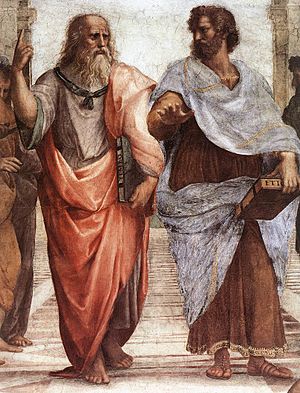Cosmological argument facts for kids
The cosmological argument is a way of thinking about whether God exists. It's also called the first cause argument. This idea suggests that everything that exists must have a cause. If you trace these causes back, there must be a very first cause that started everything. This first cause is often thought to be God.

A famous thinker named Thomas Aquinas from the Middle Ages used ideas from Aristotle to create one of the most well-known versions of this argument.
Contents
What is the First Cause Argument?
The first cause argument tries to prove that God exists by looking at the entire universe. It says that the universe must have a cause. This cause is usually seen as God.
Here's a simple way to understand the argument:
- Some things in the world are caused by something else.
- Nothing can cause itself to exist.
- So, anything that is caused must be caused by something outside of itself.
- If you keep going back in time, the chain of causes cannot go on forever. It must have a beginning.
- If there's a beginning to the chain of causes, then there must be a very first cause.
- This first cause is often called God.
The argument suggests that the universe exists, so something must have caused it. This "first cause" is believed to be God. Thomas Aquinas said that God is the only thing that wasn't caused by something else. Many theologians and philosophers have found this idea interesting.
How Does the Argument Work?
Imagine any event happening in the universe. This event is the result of some cause, or many causes working together. Each of those causes was also an event, caused by something else. This creates a huge chain of events, where earlier events lead to later ones.
Now, this chain of events either has a beginning, or it doesn't. The cosmological argument says it must have a beginning.
The Big Bang and the First Cause
The Big Bang theory says that the universe began about 13.8 billion years ago. This idea fits well with the first cause argument.
Here's how the argument looks with the Big Bang in mind:
- Anything that starts to exist must have a cause.
- The universe started to exist (according to the Big Bang).
- Therefore, the universe must have had a cause. This cause is often identified as God.
Some modern ideas in quantum physics sometimes challenge the first point. They suggest that tiny particles like electrons or photons can appear and disappear from nothing in a vacuum. However, these are very complex ideas.
See also
 In Spanish: Argumento cosmológico para niños
In Spanish: Argumento cosmológico para niños

